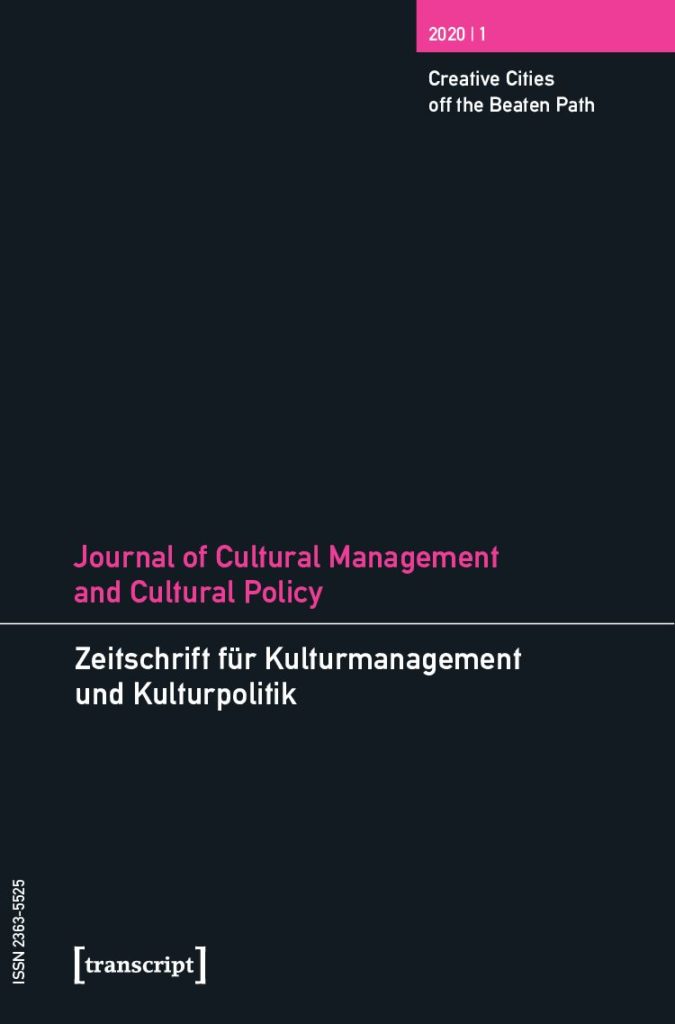Essay
On the Creative City Concept
Abstract
Thirty years ago, the concept that in some way unites culture and the city arose. In this essay, we talk about the creative city, the concept developed from the creative and cultural industries by various authors – mostly Anglo-Saxons, that defend the idea that the future of cities depends on human potential and creativity. In order to summarize different approaches to the concept of a creative city, this essay offers the historical review of the concept summed up in three basic axes. First, the creative city that focuses on the idea of creativity as a set of tools for urban development (LANDRY 2012; BAYCAN-LEVENT 2010; UNCTAD 2008). Second, the notion of a creative city that is strongly supported by the use of creative activities/industries (FLORIDA 2004; MERKEL 2008; MILES/PADDISON 2005). Finally, a third approach that, analyzing cities, highlights the ability to attract creative skills, that is, creative human resources (MILES/PADDISON 2005; PRATT 2008; SCOTT 2006).
Keywords
2020 (1)
Creative Cities off the Beaten Path

Related Articles
Martin SIGMUND: Komponieren für Events. Zur Rolle der Künste in der Eventkultur
Journal of Cultural Management 2015 (1)
Book Review
Journal of Cultural Management and Cultural Policy
Essay
Journal of Cultural Management 2016 (2)
Case Study
Journal of Cultural Management and Cultural Policy 2024 Journal of Arts Management and Cultural Policy 2020 (1)
Case Study
Yearbook for Culture Management 2013
Research Article
Journal of Arts Management and Cultural Policy 2020 (1)
Research Article
© 2025, Journal of Cultural Management and Cultural Policy
Keywords
- Aesthetics
- Higher Education
- Cultural Diplomacy and Foreign Cultural Policy
- Occupation
- Career and Professional Role
- Audience Development
- Audience Studies and Visitor Studies
- Visitor Motivations
- Business
- Covid Pandemic
- Democracy
- Digitalization
- Diversity
- Third Sector
- Empirical Aesthetics
- Development
- Ethics
- Evaluation
- Field Theory
- Festival
- Film
- Federalism
- Community Arts
- Societal Change
- Ideology
- Staging
- Career
- Communication
- Concert
- Creative Industries
- Creativity
- Crisis
- Culture
- arts organizations, cultural organizations
- Cultural Participation
- Cultural Change
- Fincancing The Arts
- Cultural Promotion Law
- Cultural History
- Cultural Management
- Cultural Economy
- Cultural Organizations
- Art Education
- Cultural Policy
- Cultural Production
- Cultural Sociology
- Art Education
- Cultural Understanding
- Arts Administration
- Cultural Industry
- Cultural Sciences
- Art
- Art Field
- Arts Research
- Artists
- Artistic Research
- Artistic Reputation
- Arts Management
- Arts Organizations
- Art education
- Arts Marketing
- Arts Administration
- Curating
- Leadership
- Literature
- Advocacy
- Management
- Marketing
- Market
- Media
- Methods Development
- Mexico
- Monumentalizing
- Museum
- Music
- Non-Visitor Studies
- Opera
- Orchestra
- Organization
- Political Expression
- Post-truth Politics
- Professional Role
- Audience
- Audience Development
- Law
- Government
- Role
- Socially Engaged Art
- Social Cohesion
- Social Change
- Social Cohesion
- Non-visitor Socio-demographics
- Socioculture
- State
- Symbolic capital
- Dance
- Participatory Justice
- Theatre
- Theatre Governance
- Theory Development
- Tourism
- Transformation
- Survey
- Entrepreneurship
- Urbanism
- Civil Society


